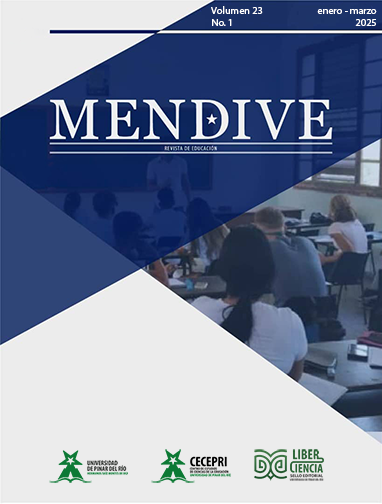Academic performance and creativity in university students: bibliographic analysis and design of a proposal to determine their relationship
Main Article Content
Abstract
The relationship between academic performance and creative ability has recently sparked increasing interest. Creativity does not only involve generating original ideas, but is related to skills such as critical thinking, problem solving, and intrinsic motivation, which contribute positively to academic performance. Therefore, it is important to foster creative environments in education that motivate students to investigate, explore, and delve deeper into their learning. This work seeks to explore the relationship between creativity and academic performance in Dominican university students, a topic that has been little researched in the Dominican Republic. The study sought to determine a correlation between these variables through an exhaustive bibliographic review and a qualitative approach methodology and non-experimental design, with a cross-sectional and documentary type. The evidence found showed that, although over the years there has not been a consensus on the relationship between academic performance and creativity, some current research indicates a positive correlation between both variables. Therefore, a design was proposed to test this hypothesis by studying a sample of students from various universities in the city of Santiago de los Caballeros, selected equally between men and women; and creativity was measured through a creative intelligence test and academic performance through the cumulative academic index. It is expected to obtain significant results that could influence the country's education, promoting strategies that foster creativity as a key to academic success.
Downloads
Article Details

This work is licensed under a Creative Commons Attribution-NonCommercial 4.0 International License.
References
Acosta Molina, L., Aristy, C. F., Almonte, Y. V., Lithgow, C. V., & de la Peña Álvarez, C. (2018). Relación entre Creatividad y Rendimiento Académico en Educación Básica.
Bano, S., Din, M., & Jabeen, M. (2021). Relationship of Creativity and Academic Performance of Students at Undergraduate Level. https://pssr.org.pk/issues/v5/2/relationship-of-creativity-and-academic-performance-of-students-at-undergraduate-level.pdf
Barbachán Ruales, E. A., Pareja Pérez, L. B., & Huambachano Coll Cárdenas, A. M. (2020). Niveles de creatividad y rendimiento académico en los estudiantes del área de Metal Mecánica de la Universidad Nacional de Educación de Perú. Universidad y Sociedad, 12(1), 202-208. http://scielo.sld.cu/scielo.php?script=sci_arttext&pid=S2218-36202020000100202#B10
Chacón Araya, Y. (2005). Una revisión crítica del concepto de creatividad. Revista Electrónica "Actualidades Investigativas en Educación". https://www.redalyc.org/pdf/447/44750106.pdf
Ferrando, M., Prieto, L., Sainz, M., & Ferrándiz, C. (2018). Creatividad y rendimiento académico. Número Temático: Desenvolvimento, Aprendizagem, Relação E Contexto Escolar, 122. https://comum.rcaap.pt/bitstream/10400.26/23077/1/PEC%20maio%2018.pdf
Fraenkel, J. R., Wallen, N. E., & Hyun, H. H. (2012). How to design and evaluate research in education (8th ed.). McGraw-Hill. https://www.scirp.org/reference/ReferencesPapers?ReferenceID=1046940
Gajda, A., Karwowski, M., & Beghetto, R. A. (2017). Creativity and academic achievement: A meta-analysis. Journal of educational psychology, 109(2).
Garbanzo Vargas, G. M. (2013). Factores asociados al rendimiento académico en estudiantes universitarios desde el nivel socioeconómico: Un estudio en la Universidad de Costa Rica. Revista Electrónica Educare, 17(3), 57-87. https://www.scielo.sa.cr/scielo.php?script=sci_arttext&pid=s1409-42582013000300004
García, P. Á. C., & García, M. F. (2018). Creatividad y rendimiento académico: un estudio de caso con alumnos de 4º curso de educación secundaria. Revista Iberoamericana de Educación, 78(2), 77-95. https://doi.org/10.35362/rie7823203
García, R. T. M. (2015). Factores que intervienen en el rendimiento académico universitario: Un estudio de caso. Opción, 31(6), 1041-1063. https://www.redalyc.org/pdf/310/31045571059.pdf
Manaf, A., Dewanti, S. S., Mam, S., Susetyawati, E., & Ernawati, I. (2022). Is there a correlation between creativity and learning achievement? A meta-analysis study. REID (Research and Evaluation in Education), 8(1). https://doi.org/10.21831/reid.v8i1.51493
Miles, M. B., Huberman, A. M., & Saldana, J. (2014). Qualitative data analysis: A methods sourcebook (3rd ed.). Sage Publications.
Roke, L., & Kâlis, E. (2015). Is there a link between creativity and school grades?: Research with 9th grade students. International Journal of Psychology: A Biopsychosocial Approach, 16, 7-22. https://doi.org/10.7220/2345-024X.16.1
Vázquez Gestal, M. (2000). Apuntes sobre creatividad: origen del término y su pervivencia. Revista Latina de Comunicación Social, 3(25). https://www.redalyc.org/pdf/819/81932506.pdf


